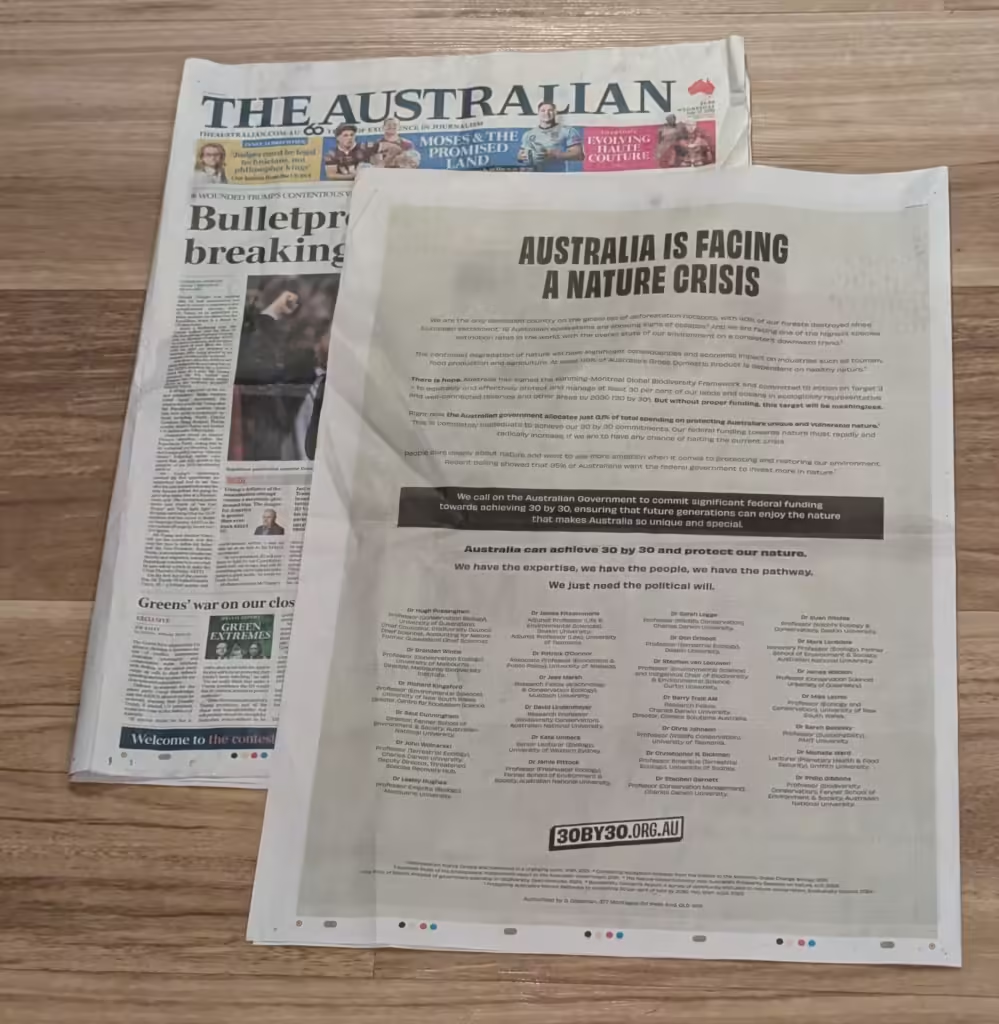In July 2024, 26 of Australia’s eminent ecology, conservation and biodiversity academics signed a joint statement, calling on the Australian Government to commit significant federal funding towards nature.

Australia is facing a nature crisis. We are the only developed country on the global list of deforestation hotspots, with 40% of our forests destroyed since European colonisation.[1] 17 Australian ecosystems are showing signs of collapse.[2] And we are facing one of the highest species extinction rates in the world, with the overall state of our environment on a consistent downward trend.[3]
The continued degradation of nature will have significant consequences and economic impact on industries such as tourism, food production and agriculture. At least 49% of Australia’s GDP is dependent on healthy nature.[4]
There is hope. Australia has signed the Kunming-Montreal Global Biodiversity Framework and committed to action on Target 3 – to equitably and effectively protect and manage at least 30 per cent of our lands and oceans in ecologically representative and well-connected reserves and other areas by 2030 (’30 by 30’). But without proper funding, this target will be meaningless.
Right now, the Australian government allocates just 0.1% of total spending on protecting Australia’s unique and vulnerable nature.[5] This is completely inadequate to achieve our 30 by 30 commitments. Our federal funding towards nature must rapidly and radically increase, if we are to have any chance of halting the current crisis.
People care deeply about nature and want to see more ambition when it comes to protecting and restoring our environment. Recent polling showed that 95% of Australians want the federal government to invest more in nature.[6]
We call on the Australian Government to commit significant federal funding towards achieving 30 by 30, ensuring that future generations can enjoy the nature that makes Australia so unique and special.
Australia can achieve 30 by 30 and protect our nature. We have the expertise, we have the people, we have the pathway.[7] We just need the political will.
Signatories:
Dr Hugh Possingham
Professor (Conservation Biology), University of Queensland.
Chief Councillor, Biodiversity Council.
Chief Scientist, Accounting for Nature.
Former Queensland Chief Scientist.
Dr Brendan Wintle
Professor (Conservation Ecology), University of Melbourne.
Director, Melbourne Biodiversity Institute.
Dr Richard Kingsford
Professor (Environmental Science), University of New South Wales Director, Centre for Ecosystem Science.
Dr Lesley Hughes
Professor Emerita (Biology), Macquarie University.
Dr John Woinarski
Professor (Terrestrial Ecology), Charles Darwin University.
Deputy Director, Threatened Species Recovery Hub.
Dr Saul Cunningham
Director, Fenner School of Environment & Society, Australian National University.
Dr Jamie Pittock
Professor (Freshwater Ecology), Fenner School of Environment & Society, Australian National University.
Dr Patrick O’Connor
Associate Professor (Economics & Public Policy), University of Adelaide.
Dr Jess Marsh
Research Fellow (Arachnology & Conservation Ecology), Murdoch University.
Dr David Lindenmayer
Research Professor (Biodiversity Conservation), Australian National University.
Dr Kate Umbers
Senior Lecturer (Zoology), Western Sydney University.
Managing Director, Invertebrates Australia.
Dr Sarah Legge
Professor (Wildlife Conservation), Charles Darwin University.
Dr Don Driscoll
Professor (Terrestrial Ecology), Deakin University.
Dr Stephen van Leeuwen
Professor (Environmental Science) and Indigenous Chair of Biodiversity & Environmental Science, Curtin University.
Dr Barry Traill AM
Research Fellow, Charles Darwin University.
Director, Climate Solutions Australia.
Dr Chris Johnson
Professor (Wildlife Conservation), University of Tasmania.
Dr Euan Ritchie
Professor (Wildlife Ecology & Conservation), Deakin University.
Dr Mark Lonsdale
Honorary Professor (Ecology), Fenner School of Environment & Society, Australian National University.
Dr James Watson
Professor (Conservation Science), University of Queensland.
Dr Stephen Garnett
Professor (Conservation Management), Charles Darwin University.
Dr Mike Letnic
Professor (Ecology and Conservation), University of New South Wales.
Dr Sarah Bekessy
Professor (Sustainability), RMIT University.
Dr Michelle Ward
Lecturer (Planetary Health & Food Security), Griffith University.
Dr Philip Gibbons
Professor (Biodiversity Conservation), Fenner School of Environment & Society, Australian National University.
Dr James Fitzsimons
Adjunct Professor (Life & Environmental Sciences),
Deakin University.
Adjunct Professor (Law), University of Tasmania.
Dr Sarah Legge
Professor (Wildlife Conservation), Charles Darwin University.
[1] Deforestation fronts: Drivers and responses in a changing world, WWF, 2021.
[2] Combating ecosystem collapse from the tropics to the Antarctic, Global Change Biology, 2021.
[3] Australia State of the Environment: independent report to the Australian Government, 2021.
[4] The Nature-based Economy: How Australia’s Prosperity Depends on Nature, ACF, 2022.
[5] The Price of Nature: Analysis of government spending on biodiversity, Cyan Ventures, 2024.
[6] Biodiversity Concerns Report: A survey of community attitudes to nature conservation, Biodiversity Council, 2024.
[7] Protecting Australia’s Nature: Pathways to protecting 30 per cent of land by 2030. TNC, WWF, ALCA, 2023.
